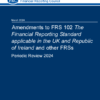
by John McCarthy Consulting Ltd. | Apr 28, 2023 | News
Following on from our earlier blogs on 11 April and 18 April about the introduction of the new Solicitors Accounts Regulations 2023, we thought that a worked example about the transition to the new rules, would be helpful.
The existing Solicitors Accounts Regulations 2014 remain applicable for any accounting period that commenced before 1 July 2023, until such time as the solicitor has filed the Reporting Accountant’s report with the Law Society. The full text of the Regulations is here.
The 2023 Regulations apply for accounting periods commencing on/after 1 July 2023. Let’s take two practical examples to clarify the position:
Law Firm Client with YE 30/4/2023 – apply the existing 2014 regulations for the full financial year to 30/4/2023 because the 2023 regulations don’t commence until 1 July 2023.
Apply the 2023 regulations from the accounting period starting on 1 May 2024 for this client, with the first quarterly test being on 31 July 2024.
Law Firm Client with YE 31/12/2023 – the existing 2014 Regulations apply for the full financial year 2023 and the new 2023 Regulations apply to this client from 1 January 2024 with the first quarterly reconciliation happening on 31 March 2024.
Please go to our website to see our new ISQM TOOLKIT or if you prefer to chat through the different audit risks and potential appropriate responses presented by this new standard, please contact John McCarthy FCA by e-mail at john@jmcc.ie.
We typically tailor training and brainstorming sessions to suit your firm’s unique requirements.
Publications and AML webinars:
- The ISQM TOOLKIT 2022 is available to purchase here.
- See our latest Anti-Money Laundering Policies Controls & Procedures Manual (March 2022) – View the Table of Contents click here.
- Also we have an updated AML webinar (March 2022) available here, which accompanies the AML Manual. It explains the current legal AML reporting position for accountancy firms and includes a quiz. Upon completion, you receive a CPD Certificate of attendance in your inbox.
- To ensure your letters of engagement and similar templates are up to date visit our site here where immediate downloads are available in Word format. A bulk discount is available for orders of five or more items if bought together.

by John McCarthy Consulting Ltd. | Apr 24, 2023 | News
According to a recent Government press release, a consultation will soon commence on proposals to enhance the Companies Act 2014.
Among the issues to be considered are:
- Amend the audit exemption regime for small/micro companies, to remove automatic loss of audit exemption and put in place a two-step, graduated procedure to deal with late filing;
- Provide companies and industrial and provident societies with the option to hold physical/hybrid and virtual meetings including AGMs and general meetings;
- Make amendments to the regulation of receivers;
- Extend certain reporting obligations to examiners, interim examiners and process advisors;
- Enhance certain powers for the Corporate Enforcement Authority, the Irish Auditing and Accounting Supervisory Authority and the Companies Registration Office to help investigate and prosecute alleged breaches of company law.
Please go to our website to see our new ISQM TOOLKIT or if you prefer to chat through the different audit risks and potential appropriate responses presented by this new standard, please contact John McCarthy FCA by e-mail at john@jmcc.ie.
We typically tailor training and brainstorming sessions to suit your firm’s unique requirements.
Publications and AML webinars:
- The ISQM TOOLKIT 2022 is available to purchase here.
- See our latest Anti-Money Laundering Policies Controls & Procedures Manual (March 2022) – View the Table of Contents click here.
- Also we have an updated AML webinar (March 2022) available here, which accompanies the AML Manual. It explains the current legal AML reporting position for accountancy firms and includes a quiz. Upon completion, you receive a CPD Certificate of attendance in your inbox.
- To ensure your letters of engagement and similar templates are up to date visit our site here where immediate downloads are available in Word format. A bulk discount is available for orders of five or more items if bought together.

by John McCarthy Consulting Ltd. | Apr 7, 2023 | News
Following on from last week’s blog about the introduction of the new Solicitors Accounts Regulations 2023, it’s worth bearing in mind that the existing Solicitors Accounts Regulations 2014 remain applicable for any accounting period that commenced before 1 July 2023, until such time as the solicitor has filed the Reporting Accountant’s report with the Law Society.
Here is a list of some of the changing and new requirements for the accounting by solicitors:
- Balancing statements must be prepared quarterly for client-account transactions;
- A list of client ledger balances outstanding for two years or more must be prepared at the accounting date, and given to the Law Society by the Reporting Accountant;
- A separate client bank account is no longer needed where a solicitor is acting as the personal representative of an estate;
- Client ledger balances must be reviewed for undue/unnecessary delays in discharging client moneys. Immediate action must be taken to clear same, where appropriate;
- Clients are to be given a statement of account for each matter;
- Client moneys are to be returned to clients when the legal service is completed;
- Evidence of payments in cash must include the witnessed signature of the recipient;
- Transfers of funds from the ‘client’ to the ‘office’ account must be for specific clients;
- The Law Society must be notified where a deficit cannot be rectified within seven days of the deficit coming to the solicitor’s attention;
- Cheque signatories or transaction authorisers on the client account are to include a solicitor who is a partner or a sole practitioner with a current practising certificate;
- A ‘Register of Undertakings’ and of ‘Funds Held On Joint Deposit’ are to be maintained;
- A file of documents or record for electronic transfers must be maintained;
- The Compliance Partner is to provide specific confirmation to the Law Society, through the ‘Form of Acknowledgement’, of compliance with the regulations in respect of:
- balancing statements;
- balances outstanding two years or more;
- review of client-ledger balances for undue or unnecessary delays; and
- back-up of computerised accounting systems.
- Borrowing/lending/organising loans from/to Client Accounts are prohibited, as are loans between Client Accounts;
- Client accounts must not hold moneys other than for the legal services provided;
- Client accounts are not to be used to hold/pass through, solicitors’ personal moneys;
- Responsibility for breach of the regulations extends to the solicitor responsible for the actual breach, and not just the principal or partners of the firm;
- The Law Society may conduct investigations remotely;
- The Law Society may instruct an authorised person to communicate with such persons and seek such information and documentation as the Society considers necessary.
The full text of the Regulations is here.
Please go to our website to see our new ISQM TOOLKIT or if you prefer to chat through the different audit risks and potential appropriate responses presented by this new standard, please contact John McCarthy FCA by e-mail at john@jmcc.ie.
We typically tailor training and brainstorming sessions to suit your firm’s unique requirements.
Publications and AML webinars:
- The ISQM TOOLKIT 2022 is available to purchase here.
- See our latest Anti-Money Laundering Policies Controls & Procedures Manual (March 2022) – View the Table of Contents click here.
- Also we have an updated AML webinar (March 2022) available here, which accompanies the AML Manual. It explains the current legal AML reporting position for accountancy firms and includes a quiz. Upon completion, you receive a CPD Certificate of attendance in your inbox.
- To ensure your letters of engagement and similar templates are up to date visit our site here where immediate downloads are available in Word format. A bulk discount is available for orders of five or more items if bought together.

by John McCarthy Consulting Ltd. | Apr 5, 2023 | News
The Law Society of Ireland has introduced new Solicitors Accounts Regulations 2023 which will come into operation on 1 July 2023. Among the changes, there are new requirements for reporting accountants.
From 1 July 2023 reporting accountants must:
- Examine Balancing Statements prepared at quarterly intervals in respect of client-account transactions (currently these are examined at six monthly intervals);
- File reports within five months of the accounting date;
- Test-check that withdrawals of fees are notified to the clients;
- Test-check postings before and after the accounting date;
- File the Closing Reporting Accountant’s Reports within three months of cessation;
- Provide reasons for the withdrawal of approval of a Reporting Accountant;
- Report, directly to the Law Society, an opinion or a suspicion of a deficit, rather than waiting to submit an annual report; and
- Provide to the Law Society a list of any client ledger balances outstanding for two years or more prepared as at the accounting date.
The full text of the Regulations is here.
Please go to our website to see our new ISQM TOOLKIT or if you prefer to chat through the different audit risks and potential appropriate responses presented by this new standard, please contact John McCarthy FCA by e-mail at john@jmcc.ie.
We typically tailor training and brainstorming sessions to suit your firm’s unique requirements.
Publications and AML webinars:
- The ISQM TOOLKIT 2022 is available to purchase here.
- See our latest Anti-Money Laundering Policies Controls & Procedures Manual (March 2022) – View the Table of Contents click here.
- Also we have an updated AML webinar (March 2022) available here, which accompanies the AML Manual. It explains the current legal AML reporting position for accountancy firms and includes a quiz. Upon completion, you receive a CPD Certificate of attendance in your inbox.
- To ensure your letters of engagement and similar templates are up to date visit our site here where immediate downloads are available in Word format. A bulk discount is available for orders of five or more items if bought together.

by John McCarthy Consulting Ltd. | Apr 1, 2023 | News
This week we continue our series looking at some lessons that auditors can learn from past Decision Notices (DN) published by the Financial Reporting Council. For the sake of brevity we are omitting the title ‘Ireland’ from the names of the ISAs as we are referring to the Irish ISAs throughout this post.
To catch up on last week’s post in the series click here.
Today we focus on the topic of revenue recognition and recoverability of debtors. Both of these are often considered high-risk areas in many audits. In the audit of the consolidated financial statements for ‘Associated British Engineering plc’ (‘ABE’) for the FY 2018 significant audit risks relating to:
- Revenue recognition and
- Recoverability of debtors
were identified in the audit file as a key audit matter (KAM).
Provision against trade debtors was a significant accounting estimate made by ABE’s management.
ISA 240.32(b) of the Auditor’s Responsibilities Relating to Fraud requires the auditor to design and perform audit procedures to review accounting estimates for biases and evaluate whether the circumstances producing any bias represent a risk of material misstatement due to fraud.
Paragraph 32(b)(ii) requires that such review must include a retrospective review of management judgements and assumptions related to significant accounting estimates reflected in the financial statements of the prior year.
ISA 240.A46 explains that a retrospective review has the purpose of determining whether there is an indication of a possible bias on the part of management.
In the circumstances of the Audit, the Respondents were required by these provisions of ISA 240 to perform a retrospective review of management’s judgements and assumptions related to the provision against trade debtors in ABE’s financial statements for the prior year. The auditors failed to comply with that requirement.
They did not carry out work which met the requirement of ISA 240.32(b)(ii) to conduct a retrospective review on the prior year’s provision against trade debtors. Such audit work as was carried out was inadequate for the purpose of meeting the requirement of ISA 240.A6.
As regards Audit Sampling the relevant section of ISA 530.6 requires the auditor, when designing an audit sample, to:
- consider the purpose of the relevant audit procedure and
- the characteristics of the population from which the sample in question will be drawn.
The auditors failed to comply with this requirement in their audit work on revenue recognition and recoverability of debtors, in that they did not appropriately address the difference between the two classes of ABE’s sales to its customers, namely
- products (predominantly engine parts) and
- services (repair work);
- they did not consider the respective risks presented by those two revenue streams; and
- they did not differentiate between them in the substantive testing work that was carried out for the Audit.
Another problem area related to ISA 701 Communicating Key Audit Matters (‘KAM(note 1) in the Auditor’s Report), by virtue of its paragraphs 9, 10, 13 and 18(a), which require the auditor:
- to determine, from the matters communicated to those charged with governance, those matters that required significant attention in performing the audit;
- to determine which of those matters were of most significance in the audit and therefore formed the KAMs; and
- to record within the audit documentation the significant matters and,
- in respect of each of them, the rationale for the auditor’s determination as to whether or not the matter is a KAM, including (in respect of each matter determined to be a KAM):a reference to any disclosure(s) in the financial statements related to the matter; and information as to:
- why the matter was determined to be a KAM; and
- how the matter was addressed in the
The auditors’ audit work in the area of revenue recognition and recoverability of debtors did not comply with the above requirements of ISA 701 even though this area was identified, both in the audit file and the auditor’s report, as a KAM.
However, the reasoning behind that identification was lacking; the audit team’s assessment of the risks in relation to revenue recognition had in fact led them to a contrary conclusion; and the identification of this matter as a KAM was an error.
Please go to our website to see our new ISQM TOOLKIT or if you prefer to chat through the different audit risks and potential appropriate responses presented by this new standard, please contact John McCarthy FCA by e-mail at john@jmcc.ie.
We typically tailor training and brainstorming sessions to suit your firm’s unique requirements.
Publications and AML webinars:
- The ISQM TOOLKIT 2022 is available to purchase here.
- See our latest Anti-Money Laundering Policies Controls & Procedures Manual (March 2022) – View the Table of Contents click here.
- Also we have an updated AML webinar (March 2022) available here, which accompanies the AML Manual. It explains the current legal AML reporting position for accountancy firms and includes a quiz. Upon completion, you receive a CPD Certificate of attendance in your inbox.
- To ensure your letters of engagement and similar templates are up to date visit our site here where immediate downloads are available in Word format. A bulk discount is available for orders of five or more items if bought together.
[1] Note that KAMS apply most frequently to listed entities but can also apply to circumstances when the auditor decides to communicate key audit matters in the auditors’; report.










